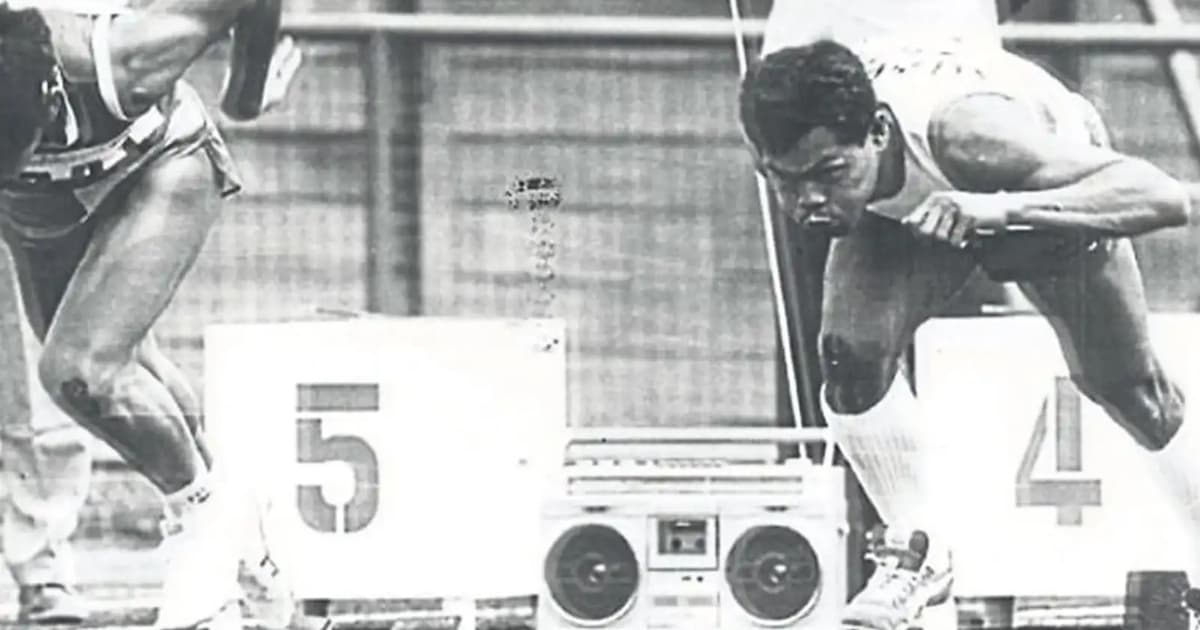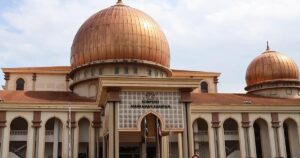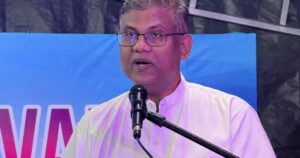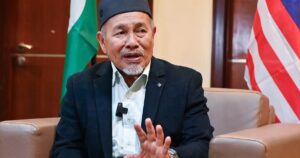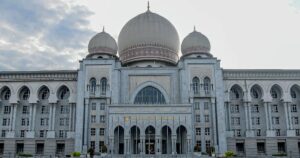
The night before the 100m final at the 1982 Asian Games, Rabuan Pit could barely walk. A sharp pain in his Achilles threatened to end his dream.
At his side was Dr Mani Jegathesan, Asia’s fastest man in 1966 and the Malaysian team doctor. His words were simple: “Run the race of your life.”
The next day, with pain tearing through his leg and pressure mounting from every corner, the kampung boy from Merlimau, Melaka, stepped onto the track in New Delhi.
Rabuan had almost withdrawn. But through the night, team doctor and sprint legend Jegathesan treated him, while manager Darshan Singh Gill urged him to believe.
On race day, teammate Ellron Angin from Sabah false started. The tension rose. Rabuan leaned over, shook his hand, and said: “Take it easy. We will give our best.”
At the restart, Rabuan exploded out of the blocks. He felt the challenge beside him but kept his eyes forward. The finish came in a blur.
The clock read 10.68 seconds. A photo finish put him ahead of South Korea‘s Chang Jae-keun and Thailand’s Suchart Jairsuraparp.
He was crowned “Asia’s fastest man.”
“I just went down on my knees and tears flowed,” Rabuan recalled. “A kampung boy from Merlimau had become the fastest man in Asia.”
It was Malaysia’s moment on the track, a victory for unity and pride.
The boy from Merlimau
Rabuan was the youngest of eight children in a rubber tapper’s family. Life in Merlimau was simple, often hard. Shoes were a luxury, running was freedom.
He dreamt big. “I wanted to prove anyone can achieve their dreams with passion, determination and discipline,” he said.
By the late 1970s, he was already making waves. At the Suharto Cup in 1980, he became national champion across the 100m, 200m, and 400m.

“His speed was raw, his work ethic relentless,” said former national sprint coach M Nadarajah.
Seven years before his Asian Games triumph, Rabuan had joined the Police Training Centre. Soon he was posted to the Police Field Force, and later the Federal Reserve Unit.
For him, sprinting and serving in uniform were never separate. Both were about discipline. “Both were about honour.”
Short career, long impact
Rabuan’s career burned bright but brief.
Injuries never left him. A heel problem curtailed his run after the 1985 SEA Games, where he still collected three silver medals.
In six years, he delivered gold medals at SEA Games and the Asian Games, tested himself against Carl Lewis at the 1983 World Championships, and twice won Malaysia’s Sportsman of the Year award.
The Olympics was his one regret. He had qualified for the 1980 Moscow Games, but Malaysia joined the boycott.
“It was sad,” he lamented. “But Delhi made up for it.”
The policeman and patriot
While his sprinting years ended early, his service to Malaysia did not.
Rabuan rose through the ranks of the Royal Malaysia Police, serving with distinction in the field and in management before retiring in 2016 as assistant commissioner.
In his eyes, his police service was as important as his athletics medals. “I wanted to do equally well in my job,” he said. “Serving Malaysia comes in many forms.”

That sense of duty defines him. To him, wearing the national vest or the police uniform meant the same thing: representing the country with pride.
An elder statesman
Today, Rabuan is sought after for something beyond his medals.
Schools invite him to speak. Young athletes listen to his stories of discipline and humility. Institutions call on him to share his experience.
He does not talk about glory. He talks about sacrifice.
“I tell them not to chase rewards. Serve first, for Malaysia. That is the real honour,” he said.
He reminds them of the nights in camp, of teammates from Sabah and Selangor, coaches of every race and background who moulded him.
“Athletics showed me Malaysia at its best — different people, one team, one dream.”

The unfulfilled promise
Yet, not all promises to him have been kept.
Rabuan was one of nine national athletes between 1966 and 1982 who never received the RM5,000 cash prize that came with the sportsman and sportswoman of the year award.
The pledge was that they would be paid upon retirement. That day came, but the money never did.
He raises it without bitterness, but with a sense of fairness. “It was promised. It should be honoured,” he said.
On Malaysia Day, his quiet reminder is that a nation must remember its heroes.
A beacon of unity
Rabuan’s story is more than the stopwatch numbers.
It is the journey of a kampung boy who ran barefoot in Melaka fields, who became Asia’s fastest man, who served in uniform, who still inspires with humility.
He represents unity: a Malay sprinter coached by Malaysians of every background and celebrated by all races. His victory was Malaysia’s victory.
And he represents service: running through pain to bring home gold, standing guard as a police officer, still giving time to young Malaysians.

Running for Malaysia
Looking back, Rabuan is grateful. To God, to his family, to the coaches who believed in him, to the police officers who gave him space to train.
“I had a dream from young to prove there is a chance for everybody to make good,” he said. “I worked hard, and many people made it possible.
“I want the young to know that discipline and love for Malaysia will take you far.”
Champions come and go. Medals fade. But the spirit of giving your best for Malaysia never should.
